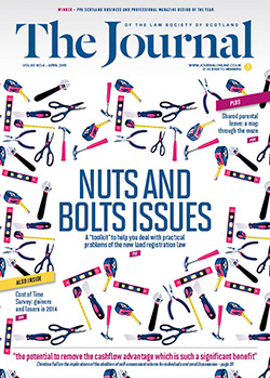A woman’s work…

Family law has been in the news of late. In recent weeks, we have heard about Mrs Wright, 51, who was told by an English judge that, in his view, divorcees with children aged over seven should work for a living. It has become known as the “get a job” case, attracting much comment from family lawyers north and south of the border. It certainly marks a stark departure from the Miller and MacFarlane cases a few years ago. The clear message to Mrs Wright was that her significant capital settlement and payments amounting to £75,000 a year for nearly eight years should be enough.
We then heard about Mr Vince and Miss Wyatt, headlines screaming: “Ex wife of Ecotricity founder wins right to millionaire’s riches – 23 years after they divorced”.
Separating spouses throughout the UK could be forgiven for reaching for their solicitor’s business card in a state of either excitement, or panic. Could such headlines appear in relation to Scottish divorce settlements?
Statutory limitations
Any order for financial provision is based on the net value of the matrimonial property at the relevant date, with the court looking at assets acquired during the marriage and what they were worth at the date of separation. The “clean break” principle is enshrined in Scottish family law. Some may say it is sacrosanct. What is the position in relation to ongoing support after divorce?
In deciding what order for financial provision, if any, to make, the court is directed to the s 9 principles: (a) fair sharing of the net value of the matrimonial property; (b) taking fair account of any economic advantage derived, or disadvantage suffered, by either party from or in the interest of the other; (c) fair sharing of the economic burden of future care for any child of the marriage under 16; (d) where a party has been dependent to a substantial degree on the financial support of the other, reasonable financial provision for up to three years to enable them to adjust; (e) where a party seems likely to suffer serious financial hardship as a result of the divorce, reasonable financial provision to relieve them of hardship over a reasonable period.
It is generally accepted by practitioners that where a capital sum is “sufficient”, it would be unusual for the court to make an award of ongoing support after divorce. Specifically, s 8(1)(b) and (2) and s 13(2) interact to allow an order under s 9(1)(d) only if a capital payment or property transfer order is inappropriate or insufficient, and if it is reasonable having regard to the parties’ resources. There has to be averment and proof that capital would be insufficient (Mackin v Mackin 1991 SLT (Sh Ct) 22). In determining whether to make such an order, the court shall have regard to (a) the age, health and earning capacity of the party claiming financial provision; (b) the duration and extent of the dependence of that party prior to divorce; (c) any intention of that party to undertake education or training; (d) the parties’ needs and resources; and (e) all the other circumstances.
Arguably there is scope for awards in respect of ongoing support post-divorce, albeit for a limited period. Yet this is rarely seen in practice. Awards under s 9(1)(d) are rarely of significant value. Sometimes the earning capacity of the working spouse is highly disproportionate to the level of capital sum payable to the stay-at-home spouse, even where unequal sharing of capital has occurred.
Clean equals fair?
To return to the popular press, a recent Daily Mail article concluded that the “value” of being a stay-at-home wife and mother amounts to approximately £172,000 per annum. The current public interest in awards made on divorce perhaps serves as a reminder to practitioners about the interplay of the 1985 Act principles, and should encourage more creative thinking and challenging of received wisdom on the issue of ongoing support. In advising a client, it remains the case in Scotland that, for the time being at least, the clean break principle encourages just that.
While this may seem to be fair and reasonable where a spouse has the ability to retrain or find employment and forge a new future, the same cannot necessarily be said for those closer to retirement age, when prospects of finding employment sufficient to maintain a previously comfortable lifestyle are poor. On one view, the principle does not sit well with the concept of equality. It will be interesting to see how Scottish case law evolves given the recent judicial activity south of the border.
In this issue
- Keeping Government responsible
- Contempt, or good faith?
- Reform – 170 years on
- Employee ownership: adding trust
- The gender gap: coming clean
- Cyber risk - are you covered?
- Reading for pleasure
- Opinion: Graham Sykes
- Book reviews
- Profile
- President's column
- Land Register completion update
- People on the move
- Tools for today's titles
- Those elusive profits
- The Budget and the crystal ball
- Child of our time?
- Elephant in very many rooms
- Video: the best evidence?
- Who would be a legislator?
- Sustainability: applying the presumption
- A woman’s work…
- Scottish Solicitors Discipline Tribunal
- Living the dram
- Land information: a one-stop shop
- From the Brussels office
- Registered paralegals: what trends?
- Law reform roundup
- MHO reports – please help with timing data
- Plaque marks WW1 lawyer dead
- Selling yourself from day one
- View from the grass roots
- Keep it in the family
- Ask Ash
- When cooling-off kicks in
- Bottom line, the accountants are coming
- First day in the office






